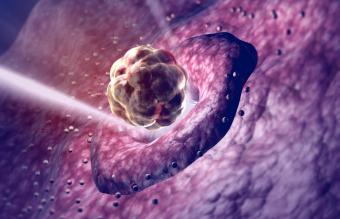
During your pregnancy, if your belly button pops out and gets bigger as your abdomen expands, you likely have an umbilical hernia. They are not unusual in pregnancy but rarely require treatment while you are pregnant unless you develop complications.
The Umbilical Hernia
According to the National Institutes of Health, an umbilical hernia is a protrusion or herniation of the lining (peritoneum) of the abdominal cavity to into the umbilicus or navel. Bowel then herniates into the sac and can be pushed back in the belly if the opening is wide.
The abdominal lining gets into the belly button through an opening in the over-lying muscles at the navel when the muscles are weak or stretched and separate.
During Pregnancy
During pregnancy an umbilical hernia can form when the abdominal muscles and tissues stretch to accommodate the growing uterus. With each subsequent pregnancy the chance of an umbilical hernia increases as the muscles might be weaker.
Other risk factors for a hernia in pregnancy include:
- More than one baby on board
- A big baby
- Overweight
- Previous abdominal surgery
- A history of straining or heavy lifting
An umbilical hernia does not put your baby at risk, unless you have complications that require surgery.
Symptoms
You can see and feel a soft bulge at your navel when you have an umbilical hernia. The bulge will protrude more when you cough or sneeze or strain at a bowel movement. Bowel can be squeezed in the hernia sac and cause you pressure or pain.
Entrapment and Strangulation
If a loop of bowel gets trapped and strangled in the sac and its blood supply is cut off, you will have more severe, sharp pain and nausea and vomiting.
Strangulation requires emergency surgery to prevent gangrene of the bowel and serious complications, including death of you and your baby.
Avoid
Avoid heavy lifting, constipation, staining or heavy coughing if you have a hernia,
Treatment
During pregnancy, unless there is significant discomfort or symptoms of bowel entrapment or strangulation, treatment of an umbilical hernia is not necessary or advisable.
After Pregnancy
After your baby is born if you don't have bothersome pain or other symptoms of bowel entrapment and you are advised to wait until after you complete your child bearing to repair your umbilical hernia. Discuss the advisable of this with your doctor.
Surgical Repair
According to the American College of Surgeons, surgery is the only way to fix an umbilical hernia. Surgical repair includes closing the muscles over the hernia sac or stitching a mesh over it if the defect is big. The mesh can be placed through an open incision or by laparoscopy.
When to Consult Your Doctor
If you have an umbilical hernia consult your doctor or midwife if you get recurrent or persistent abdominal pain around your navel or elsewhere in your belly. This is more urgent if you have severe pain or nausea and vomiting.







